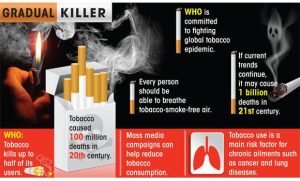[ad_1]
Introduction:
Despite a relatively high degree of societal attention and debate spurring on the pace of COVID-19 vaccine development, the novel coronavirus pandemic has continued to remain a serious public health concern worldwide.
India is reported to have lost half a million of its people to the pandemic over the past two years.
But there is a silent killer in our midst that kills an estimated 1.35 million Indians every year.
It is the use of tobacco as a result of which more than 3,500 Indians die every single day, as estimated by scientific studies.
It also comes at a heavy cost: an annual economic burden of ₹1,77,340 crore to the country or more than 1% of India’s Gross Domestic Product (GDP).
Seriousness of Tobacco Epidemic:
- Tobacco use is known to be a major risk factor for several non-communicable diseases such as cancer, cardiovascular disease, diabetes, and chronic lung diseases. Nearly 27% of all cancers in India are due to tobacco usage.
- Although not a communicable disease like SARS-CoV-2, the tobacco epidemic — as the World Health Organization characterises it has some definitive solutions that can reduce the death toll.
- Research from many countries around the world including India shows that a price increase induces people to quit or reduce tobacco use as well as discourages non-users from getting into the habit of tobacco use.
- There is overwhelming consensus within the research community that taxation is one of the most cost-effective measures to reduce demand for tobacco products.
- Nevertheless, ever since the introduction of the Goods and Services Tax (GST) legislation in 2017, there has been no significant tax increase on any tobacco product barring a minor increase in the National Calamity Contingent Duty (NCCD) during the Union Budget 2020-21 which only had the effect of increasing cigarette prices by roughly 5%.
Lost opportunity in the Budget announcement:
- In short, there has been no significant tax increase on any tobacco product for four years in a row which is quite unlike the pre-GST years where the Union government and many State governments used to effect regular tax increases on tobacco products.
- As peer-reviewed studies show, the lack of tax increase over these years has made all tobacco products increasingly more affordable.
- The Union Budget 2022-23 was an excellent opportunity for the Government of India to buck this trend (of not effecting a significant price increase for the longest time in a row) and significantly increase either excise duties or NCCDs on tobacco products.
- Needless to say, the tobacco industry and the public health community did expect such a move.
- This year, when the Finance Minister began her Budget speech, it was interesting to note that the movement of ITC stock was stable in contrast to most other stock indices, which were generally moving up.
- Just as the Budget speech concluded, and having realised that there were no tax hike proposals whatsoever on any tobacco product, ITC stocks gained by more than 6% and outperformed most other stocks in the next couple of hours.
- The market was just pricing in an unrealised negative prospect for the company.
- The reason is this: despite the claims of a business diversification away from the tobacco business, close to 85% of ITC’s profits are still derived from its cigarette segment.
- India adopted the tobacco control provisions under WHO Framework Convention on Tobacco Control (WHO FCTC).
Significant blow to tobacco control efforts in India in particular:
The absence of a tax increase on tobacco has the potential to reverse the reduction in tobacco use prevalence that India saw during the last decade and now push more people into harm’s way.
It is known that more affordable tobacco products could attract new users especially among the youth.
It would also mean foregone tax revenues for the Government especially at a time when the Government of India is looking forward to increasing the share of public spending on health; in the recent Union Budget, it has budgeted 2.2% of the total expenditures towards health.
GST Council should act:
The Union Budget exercise, however, is not the only opportunity to initiate a tax increase on tobacco products.
The Goods and Services Tax (GST) Council could well raise either the GST rate or the compensation cess levied on tobacco products especially when the Government is looking to rationalise GST rates and increase them for certain items.
For example, there is absolutely no public health rationale why a very harmful product such as the bidi does not have a cess levied on it under the GST while all other tobacco products attract a cess.
Similarly, there is no rationale why the specific cess applied on cigarettes (which is currently the largest component of overall cigarette taxes) has remained unchanged for four years in the face of increasing inflation.
Conclusion:
Since specific cess is applied as a fixed amount per stick of cigarette, increasing inflation will decrease the significance of this particular tax component making cigarette prices more affordable and reducing its effective tax burden.
GST Council meetings must strive to keep public health ahead of the interests of the tobacco industry and significantly increase either the GST rates or the GST compensation cess rates applied on all tobacco products.
The aim should be to arrest the increasing affordability of tobacco products in India and also rationalise tobacco taxation under the GST.
[ad_2]


